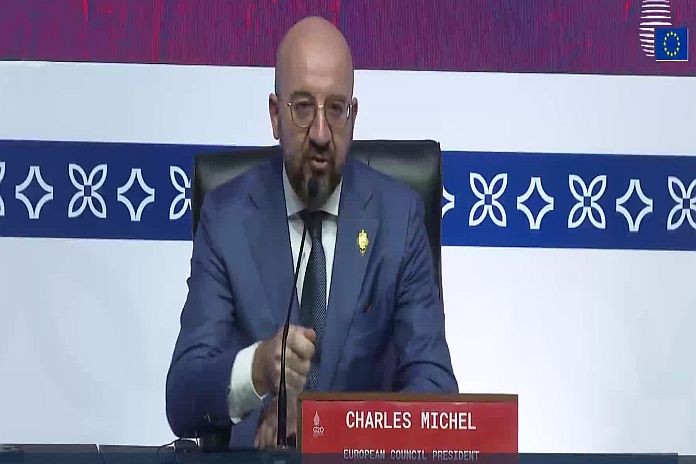-
-
- Remarks by President Charles Michel before the G20 summit in Bali
-
By Charles Michel
This G20 is one of the most difficult ones that there have ever been. And I would like first to congratulate president Widodo for his wise leadership; the fact that we have arrived at an agreement on the statement at Sherpa level is an achievement in its own right. We are here to engage and to defend the multilateral world order, and we are here to help the G20 solve challenges for the benefit of us all.
This G20 takes place in a very different world from our meeting last year in Rome. Russia, a permanent member of the UN Security Council and a member of G20, is attacking the free and sovereign nation of Ukraine. Russia’s war impacts us all no matter where we live, from Europe to Africa or the Middle East. And the single best way to end the acute crisis in food and energy is for Russia to end this senseless war and to respect the UN Charter.
We will also have the occasion to address the major challenge of food security. The number of people facing severe hunger and malnutrition is rising. The Kremlin has decided to weaponise food, driving up hunger, poverty and instability. It is also having dramatic global consequences on the developing world, including right here in Asia. And let me be clear, I repeat once again, EU sanctions adopted against Russia do not target agriculture and food products and they do not target the export of fertiliser from Russia.
On the other hand, Russia has imposed restrictions on the export of its own foodstuffs and, even before they launched the war, imposed restrictions on fertilisers. In the EU, we are working hard to address the global consequences of this war and this is why we are mobilising funds of €8 billion to address food security, notably for the developing world. Before the war, Ukraine exported 45 billion tonnes of agricultural goods to the world via the EU solidarity lanes. We have managed to help Ukraine export 15 million tonnes and an additional ten million have been exported thanks to the Black Sea Grain Initiative.
And it is important that this initiative of UN Secretary-General Guterres be continued. We must also address soaring fertiliser prices and disruption in fertiliser supplies, and I am looking forward to joining a dedicated side event on this topic tomorrow. I am still convinced that we can and we should support developing countries to produce their own sustainable fertilisers locally, like we did with COVID vaccines.
The energy crisis hurts families, increases costs for businesses and destabilises energy markets globally. As G20, we have the collective power, but also the collective responsibility, to help make sure the world has sustainable, secure and affordable energy for all. And in the EU, you know that we have in part based our transition strategy on reliable and affordable gas, and we need now to adopt that strategy. And we are grateful to those partners who have helped us to ensure urgent supplies, but prices need to be affordable and we need to implement concrete measures. In the EU, we are phasing out our dependence on Russian energy. We are diversifying our energy sources. We are speeding up renewables and bolstering our energy efficiency.
Climate neutrality by 2050 is and remains our guiding compass. The EU collectively remained the largest contributor to public climate funds of €23 billion in 2021. As G20, we should work to steer a contribution to climate funds and we need to deliver on the US$100 billion per year we have promised. It is time for the other developed partners to pay their fair share too. We are also supporting countries to decarbonise the industry. We are trying to help them to speed up their transition to green energy and technology. And our Just Energy Transition Partnership with South Africa, for instance, is a great example. We are ready for more partnerships like this.
Finally, one word on health. Two years ago, I proposed, together with Dr Tedros, a treaty on pandemics in order to learn the lessons from this COVID crisis. Negotiations on that treaty are now ongoing, and this is another concrete demonstration of great multilateralism anchored in solidarity, transparency and global coordination.
Let me conclude with a word of congratulations to president Joko Widodo. When we sat together just a few days ago in Cambodia, both of us shared the importance of this G20 being a success, and I sincerely hope it will be. Let’s recover together. Let’s recover stronger.





